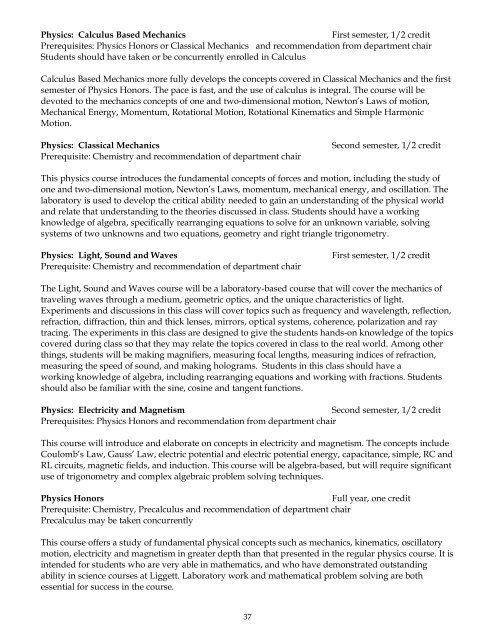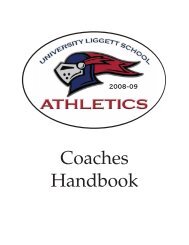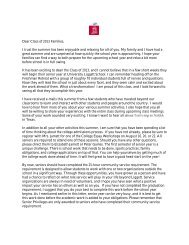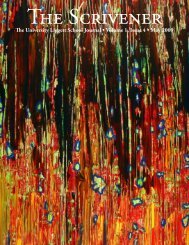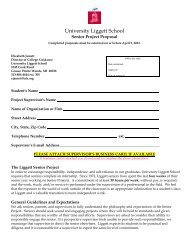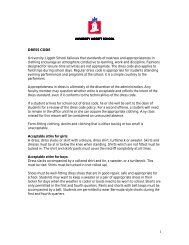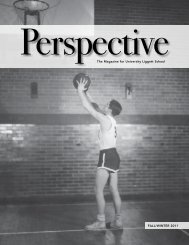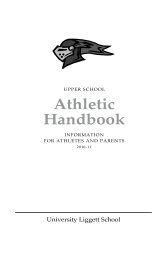2012-13 upper school course description book - University Liggett ...
2012-13 upper school course description book - University Liggett ...
2012-13 upper school course description book - University Liggett ...
You also want an ePaper? Increase the reach of your titles
YUMPU automatically turns print PDFs into web optimized ePapers that Google loves.
Physics: Calculus Based Mechanics<br />
First semester, 1/2 credit<br />
Prerequisites: Physics Honors or Classical Mechanics and recommendation from department chair<br />
Students should have taken or be concurrently enrolled in Calculus<br />
Calculus Based Mechanics more fully develops the concepts covered in Classical Mechanics and the first<br />
semester of Physics Honors. The pace is fast, and the use of calculus is integral. The <strong>course</strong> will be<br />
devoted to the mechanics concepts of one and two-dimensional motion, Newton’s Laws of motion,<br />
Mechanical Energy, Momentum, Rotational Motion, Rotational Kinematics and Simple Harmonic<br />
Motion.<br />
Physics: Classical Mechanics<br />
Prerequisite: Chemistry and recommendation of department chair<br />
Second semester, 1/2 credit<br />
This physics <strong>course</strong> introduces the fundamental concepts of forces and motion, including the study of<br />
one and two-dimensional motion, Newton’s Laws, momentum, mechanical energy, and oscillation. The<br />
laboratory is used to develop the critical ability needed to gain an understanding of the physical world<br />
and relate that understanding to the theories discussed in class. Students should have a working<br />
knowledge of algebra, specifically rearranging equations to solve for an unknown variable, solving<br />
systems of two unknowns and two equations, geometry and right triangle trigonometry.<br />
Physics: Light, Sound and Waves<br />
Prerequisite: Chemistry and recommendation of department chair<br />
First semester, 1/2 credit<br />
The Light, Sound and Waves <strong>course</strong> will be a laboratory-based <strong>course</strong> that will cover the mechanics of<br />
traveling waves through a medium, geometric optics, and the unique characteristics of light.<br />
Experiments and discussions in this class will cover topics such as frequency and wavelength, reflection,<br />
refraction, diffraction, thin and thick lenses, mirrors, optical systems, coherence, polarization and ray<br />
tracing. The experiments in this class are designed to give the students hands-on knowledge of the topics<br />
covered during class so that they may relate the topics covered in class to the real world. Among other<br />
things, students will be making magnifiers, measuring focal lengths, measuring indices of refraction,<br />
measuring the speed of sound, and making holograms. Students in this class should have a<br />
working knowledge of algebra, including rearranging equations and working with fractions. Students<br />
should also be familiar with the sine, cosine and tangent functions.<br />
Physics: Electricity and Magnetism<br />
Second semester, 1/2 credit<br />
Prerequisites: Physics Honors and recommendation from department chair<br />
This <strong>course</strong> will introduce and elaborate on concepts in electricity and magnetism. The concepts include<br />
Coulomb’s Law, Gauss’ Law, electric potential and electric potential energy, capacitance, simple, RC and<br />
RL circuits, magnetic fields, and induction. This <strong>course</strong> will be algebra-based, but will require significant<br />
use of trigonometry and complex algebraic problem solving techniques.<br />
Physics Honors<br />
Full year, one credit<br />
Prerequisite: Chemistry, Precalculus and recommendation of department chair<br />
Precalculus may be taken concurrently<br />
This <strong>course</strong> offers a study of fundamental physical concepts such as mechanics, kinematics, oscillatory<br />
motion, electricity and magnetism in greater depth than that presented in the regular physics <strong>course</strong>. It is<br />
intended for students who are very able in mathematics, and who have demonstrated outstanding<br />
ability in science <strong>course</strong>s at <strong>Liggett</strong>. Laboratory work and mathematical problem solving are both<br />
essential for success in the <strong>course</strong>.<br />
37


